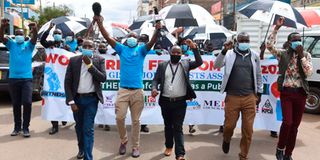Scribes in Eastern Africa mark World Press Freedom Day

Journalists in Eldoret, Uasin Gishu County, march during a procession to mark the World Press Freedom Day on May 3, 2021.
What you need to know:
- Financially struggling media houses have been forced to innovate and diversify their sources of revenue.
- Some of the gains made by the profession include timely and accurate coverage of human rights abuse and corruption during the pandemic.
Journalists and media owners from across Eastern Africa yesterday called for greater independence from the government, saying access to information was key to the development of any nation.
The journalists, who spoke during this year’s World Press Freedom Day — celebrated virtually due to the Covid-19 pandemic — said despite progress made in the past, a number of journalists and media organisations in the region continued to face harassment and intimidation from the government.
“Media freedom is the beating heart of a functioning democracy. Freedom of expression, through a free and responsible media, is central. A free press forms a foundation for economic prosperity, for social development, for more open and inclusive societies,” said Mr James Duddridge, UK Minister for Africa, the keynote speaker at the virtual conference.
Mr Stephen Gitagama, chairman of the Media Owners Association, said a free and independent press was the building block of any prosperous nation, and that the intimidation of journalists and media houses was bad for the social, political and the economic growth of any country.
“Our region has a fair share of very committed, value-driven journalists. Sadly, we also have powerful forces who are very keen on killing the story. This has seen incidence of threats and attacks on journalists,” said Mr Stephen Gitagama who is also the group chief executive officer of the Nation Media Group.
Ms Muthoki Mumo of the Committee to Protect journalists said an increasing number of journalists were arrested during the pandemic as it provided government with the excuses for committing human rights abuses in the guise of enforcing Covid-19 containment measures.
“In 2020 we saw the highest number of journalists detained across the world since we started collecting these data in 1992. We have seen journalists imprisoned for reporting on the pandemic. We have seen employment of tools of blunt censorship online in countries like Uganda, Ethiopia and even Tanzania, with government trying to control online speech,” she said.
Declining revenues
Dr Yumiko Yokozeki, the Director Unesco Addis Ababa Liaison Office to AU, said an independent media was the backbone of any functioning government and society, and raised concerns over the dangers faced by journalists in the line of duty.
“Whereas we are to ensure flow of information for the public good, we have to be cognisant of the fact that misinformation and hate speech are some of the challenges we have to counter in this digital era where everyone can post anything online,” Dr Yokozeki said
Media owners cited the increasingly declining revenues for the businesses, which they said had affected the human capital, leading to reduced quality. Media houses have as a result been forced to innovate and diversify their sources of revenue.
“Moments came when we had to swallow very bitter pills, but doing that allowed us to keep the spirit up and support our newsrooms. At Nation Media Group, we this year turned on the region’s first paywall to live this reality. Looking back three months now, the lessons are enormous and the response most encouraging,” said Mr Gitagama.
The conference also highlighted some of the gains made by the profession like the timely and accurate coverage of the pandemic, and the scandals, human rights abuse and corruption during the pandemic.
“The pandemic has reminded many that journalists are essential workers,” said Dr Peter Mwesige, the Executive Director of Africa Center for Media Excellence.
Kenya Editors Guild President Churchill Otieno said: “As the region reflects on media, our burden is shared globally. The world has resolved to focus on economic viability of news media, the transparency of Internet companies, and enhanced media and information literacy that enable people to value, defend and demand journalism as a vital part of information as a public good. There is hope.”






